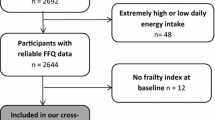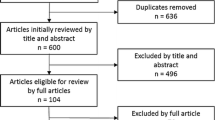Abstract
Objectives
To examine associations between dietary patterns identified by factor analysis, and successful ageing.
Design
Prospective cohort study with diet measured in 1990-4, and successful ageing in 2003-7. Ordered logistic regression with outcome determined as dead/usual ageing/successful ageing was used to examine associations with quintile groups of dietary factor scores.
Participants
Men and women (n=6308), without history of major illness at baseline, and aged >70 years at follow-up, or who had died before follow-up but would have been aged >70 at the commencement of follow-up, from the Melbourne Collaborative Cohort Study.
Measurements
Frequencies of intake of 121 foods at baseline were collected in a food frequency questionnaire. Anthropometry and other health and lifestyle data were collected. At follow-up, questionnaire data relating to mental health, physical function and medical history were used to define successful ageing.
Results
Four dietary factors were identified, characterized by higher loadings for (1) vegetables; (2) fruit, (3) feta, legumes, salad, olive oil, and inverse loadings for tea, margarine, cake, sweet biscuits and puddings; (4) meat, white bread, savoury pastry dishes and fried foods. In models excluding body size, the second factor ‘Fruit’ was positively associated with successful ageing (OR in top 20% vs lowest 20% of score 1.31, 95%CI (1.05–1.63), p trend across quintile groups 0.001); while the fourth factor ‘Meat/fatty foods’ was inversely associated (OR in top 20% vs lowest 20% of score 0.69, 95%CI (0.55–0.86), p trend across quintile groups 0.001). Factors 1 and 3 did not show significant associations with successful ageing. The association for ‘Fruit’ was little altered after adjustment for body size, while for ‘Meat/fatty foods’ the association was somewhat attenuated.
Conclusion
A dietary pattern including plenty of fruit while limiting meat and fried foods may improve the likelihood of ageing successfully.
Similar content being viewed by others
References
Ocke MC. Evaluation of methodologies for assessing the overall diet: dietary quality scores and dietary pattern analysis. Proc Nutr Soc: 2013;1–9.
Hodge AM, English DR, O’Dea K et al. Dietary patterns and diabetes incidence in the Melbourne Collaborative Cohort Study. Am J Epidemiol 2007;165: 603–610.
Harriss LR, English DR, Powles J et al. Dietary patterns and cardiovascular mortality in the Melbourne Collaborative Cohort Study. Am J Clin Nutr 2007;86: 221–229.
Baglietto L, Krishnan K, Severi G et al. Dietary patterns and risk of breast cancer. Br J Cancer 2011;104: 524–531.
Rowe JW & Kahn RL. Successful aging. Gerontologist 1997;37: 433–440.
Sun Q, Townsend MK, Okereke OI et al. Adiposity and weight change in mid-life in relation to healthy survival after age 70 in women: prospective cohort study. BMJ 2009;339: b3796.
Sun Q, Townsend MK, Okereke OI et al. Physical activity at midlife in relation to successful survival in women at age 70 years or older. Arch Intern Med 2010;170: 194–201.
Giles GG & English DR. The Melbourne Collaborative Cohort Study. Nutrition and Lifestyle: Opportunities for Cancer Prevention, 2002;69–70.
Ireland P, Jolley D, Giles GG et al. Development of the Melbourne FFQ: a food frequency questionnaire for use in an Australian prospective study involving and ethnically diverse cohort. Asia Pac J Clin Nutr 1994;3: 19–31.
Pink B. An Introduction to Socio-Economic Indexes for Areas (SEIFA) 2006, [ABo Statistics, editor]. Canberra: Commonwealth of Australia, 2008.
Ware JE, Jr., Kosinski M, Bayliss MS et al. Comparison of methods for the scoring and statistical analysis of SF-36 health profile and summary measures: summary of results from the Medical Outcomes Study. Med Care 1995;33: AS264–279.
Gandek B, Ware JE, Aaronson NK et al. Cross-validation of item selection and scoring for the SF-12 Health Survey in nine countries: results from the IQOLA Project. International Quality of Life Assessment. J Clin Epidemiol 1998;51: 1171–1178.
Yen CH, Yeh CJ, Wang CC et al. Determinants of cognitive impairment over time among the elderly in Taiwan: results of the national longitudinal study. Arch Gerontol Geriatr 50 Suppl 2010;1: S53–57.
Kessler RC, Andrews G, Colpe LJ et al. Short screening scales to monitor population prevalences and trends in non-specific psychological distress. Psychol Med 2002;32: 959–976.
Brooks RT, Beard J & Steel Z. Factor structure and interpretation of the K10. Psychol Assess 2006;18: 62–70.
Andrews G & Slade T. Interpreting scores on the Kessler Psychological Distress Scale (K10). Aust N Z J Public Health 2001;25: 494–497.
Houston DK, Stevens J, Cai J et al. Dairy, fruit, and vegetable intakes and functional limitations and disability in a biracial cohort: the Atherosclerosis Risk in Communities Study. Am J Clin Nutr 2005;81: 515–522.
Anderson AL, Harris TB, Tylavsky FA et al. Dietary patterns and survival of older adults. J Am Diet Assoc 2011;111: 84–91.
Gu Y & Scarmeas N. Dietary patterns in Alzheimer’s disease and cognitive aging. Curr Alzheimer Res 2011;8: 510–519.
Keller HH. Nutrition and health-related quality of life in frail older adults. J Nutr Health Aging 2004;8: 245–252.
Trichopoulou A, Costacou T, Bamia C et al. Adherence to a Mediterranean diet and survival in a Greek population. N Engl J Med 2003;348: 2599–2608.
Sofi F, Cesari F, Abbate R et al. Adherence to Mediterranean diet and health status: meta-analysis. BMJ 2008;337: a1344.
Martinez-Gonzalez MA, de la Fuente-Arrillaga C, Nunez-Cordoba JM et al. Adherence to Mediterranean diet and risk of developing diabetes: prospective cohort study. BMJ 2008;336: 1348–1351.
Hodge A, Almeida OP, English DR et al. Patterns of dietary intake and psychological distress in older Australians: benefits not just from a Mediterranean diet. Int Psychogeriatr 2013;25: 456–466.
Hodge AM, English DR, Itsiopoulos C et al. Does a Mediterranean diet reduce the mortality risk associated with diabetes: evidence from the Melbourne Collaborative Cohort Study. Nutr Metab Cardiovasc Dis 2011;21: 733–739.
Estruch R, Ros E, Salas-Salvado J et al. Primary prevention of cardiovascular disease with a Mediterranean diet. N Engl J Med 2013;368: 1279–1290.
Valls-Pedret C, Lamuela-Raventos RM, Medina-Remon A et al. Polyphenol-rich foods in the Mediterranean diet are associated with better cognitive function in elderly subjects at high cardiovascular risk. J Alzheimers Dis 2012;29: 773–782.
Davinelli S, Willcox DC & Scapagnini G. Extending healthy ageing: nutrient sensitive pathway and centenarian population. Immun Ageing 2012;9: 9.
Inzitari M, Doets E, Bartali B et al. Nutrition in the age-related disablement process. J Nutr Health Aging 2011;15: 599–604.
Author information
Authors and Affiliations
Corresponding author
Rights and permissions
About this article
Cite this article
Hodge, A.M., O’Dea, K., English, D.R. et al. Dietary patterns as predictors of successful ageing. J Nutr Health Aging 18, 221–227 (2014). https://doi.org/10.1007/s12603-013-0405-0
Received:
Accepted:
Published:
Issue Date:
DOI: https://doi.org/10.1007/s12603-013-0405-0




